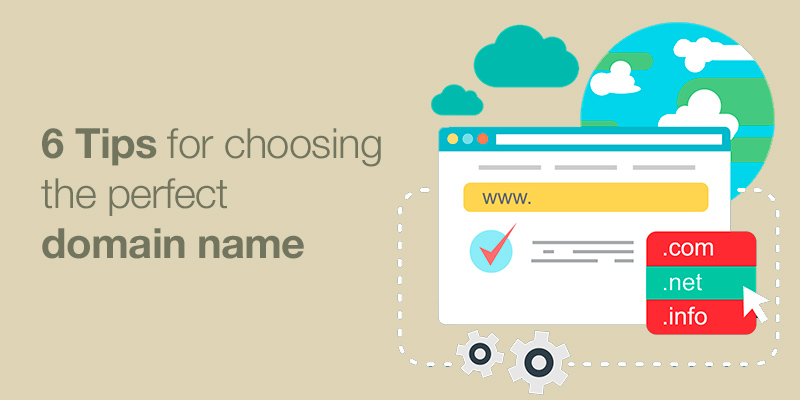Our blog
6 Tips for Choosing the Perfect Domain Name

Choosing the right domain name is a vitally important process that often gets overlooked. A domain name functions as an online identity: the ideal domain name will be memorable, create a foundation for your brand, and allow visitors and potential customers to instantly get a feel for what your business entails. Below are some of the best ways to approach choosing a domain name to ensure the best chance at success.
Keep it Simple
A domain name that is overly long or complicated will be difficult to type and remember. For this reason, it is almost always best to stick with something short and sweet instead. If you are able to distill your business or the focus of your site into one or two words, it is much more likely that visitors will be able to find your site and remember your domain name. Try to avoid commonly misspelled words or words that have nothing to with your domain, however.
Ditch Numbers and Symbols
Avoid the temptation to add numerals, hyphens, or other symbols to your domain name. While it may seem creative and quirky at first, it can make your domain name much more difficult to remember, spell, and pronounce. If customers can’t tell friends and associates what the name of your website is, your traffic will suffer.
Target Your Audience
Creating a domain name with a specific audience in mind can be helpful. One of the more common examples of tailoring your marketing to an audience is when you are creating a website for a local or regional business, in which case adding the name of a city or state to the domain name can make it more obvious and easier to find. If you are targeting a niche group with your business or blog, you may be able to use jargon or terminology in you domain name that wouldn’t be appropriate for a more general audience.
Make it Memorable
Though it’s certainly easier said than done, a memorable domain name can do wonders for your marketability and reduce the amount of brand advertising necessary to earn recognition. Consider sites like Google and Amazon, which are instantly memorable despite the fact that their names don’t actually tell you what their company does. A unique, memorable name that stands out from the crowd can be a major asset, but beware of choosing something too vague or obscure for a domain name if you aren’t willing to promote it.
Do Your Research
Researching potential domain names has a few different benefits: if you focus on keyword research, it may provide you with an opportunity to find a domain name composed of highly-searched, low-competition words that are relevant to your business or niche. Research also comes into play when determining whether the name you’ve selected is already trademarked, copyrighted, or otherwise in use by another company. Failure to research your domain name beforehand can lead to potential legal and financial disaster, so don’t skip out on this step!
Choose the Appropriate Extension
Generally speaking, .com extensions are the most useful and sought-after suffix for your domain name. However, other extensions, such as .net, .org, and .co all have unique and specific purposes associated with them, so consider alternatives if you think your domain might be better suited to a different extension. In some countries, you may also have to factor in the country code top-level domain: for instance, someone creating a site in the UK may be wise to pass on a domain name if the .com and .uk extension are not both available.
Final notes
Choosing a domain name is a decision that deserves the proper amount of diligence and consideration. A great domain name can make your site more marketable, more recognizable, and more profitable, while a poor domain name can spell doom for a site that might have otherwise been successful. Use the techniques above while deciding on a domain name to steer clear of potential pitfalls.
